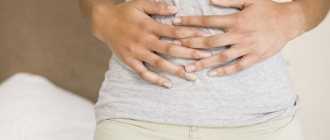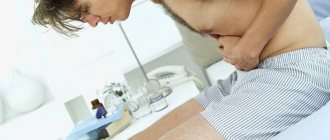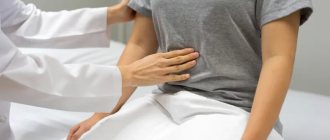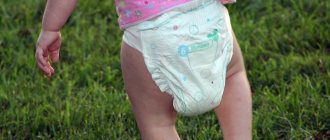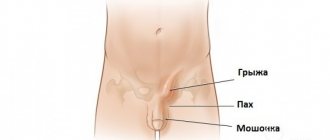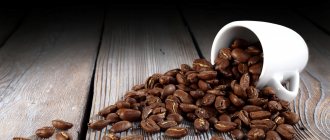What diseases can cause blood in the stool and what does it look like?
Blood in the stool is one of the main symptoms of colon cancer, which does not exclude hemorrhoids. Self-diagnosis and, especially, self-medication in this case are not only inappropriate, but also pose a direct threat to the patient’s life. Common diseases with these symptoms include:
- Anal fissure (there is little blood, it is scarlet in color and is often separated from the stool);
- Hemorrhoids (dark blood, appears on the surface of the stool and does not mix with the masses, pain, itching and burning in the anus are added to the symptoms);
- Proctitis (light blood, mixed with mucus, there is cramping pain in the abdomen with the urge to defecate - tenesmus and imperative urge to defecate);
- Polyps of the rectum and colon rarely have clinical manifestations (if they are large in size and located close to the anus);
- Cancer of the rectum, colon (scarlet or dark blood, with or without clots, often with mucus, pain in the depths of the intestine, abnormal bowel movements for no apparent reason);
- Cancer of other parts of the intestine (scarlet or dark blood, with or without clots, often with mucus, pain in the depths of the intestine, bowel dysfunction for no apparent reason, anemia (low hemoglobin level), fever for no reason);
- Intestinal diverticula (dark blood mixed with stool, there may be pain and fever when the diverticulum is inflamed);
- Stomach or duodenal ulcer (vomiting blood, black, foul-smelling stools);
- Nonspecific ulcerative colitis (dark blood, with clots and streaks in the stool, mucus, pus, diarrhea, hyperemia, general intoxication);
- Crohn's disease (blood mixed with stool, pus, mucus, diarrhea, joint and abdominal pain);
- Varicose veins of the esophagus (dark scarlet blood);
- Trauma to the anus (scarlet blood without stool).
Lactase deficiency in adults
This is a fairly rare pathology, which is characterized by a lack of enzymes responsible for the breakdown of milk sugar molecules (hypolactasia). The main group of patients with this disease are children of the first year of life, as well as children of the younger age group (up to 3 years). In adults, the incidence of hypolactasia diagnosis is approximately 8.9%. With lactase deficiency, the human body cannot digest not only whole milk, but also any products that contain milk sugar (lactose): cheeses, cottage cheese, kefir, yogurt.
It is impossible to recognize the disease in an adult without laboratory diagnostics, but you can independently identify pathological symptoms, especially if they occur after consuming milk and milk-based products. Symptoms of hypolactasia include:
- stool liquefaction and diarrhea, provoked by an increase in osmotic pressure and the influx of water into the intestinal cavity;
- pain in the lower abdomen, which becomes spasmodic when intensified;
- bloating (mostly without flatulence syndrome - involuntary passage of gases);
- appearance of milk flakes in feces.
In some patients, hypolactasia manifests itself as chronic constipation. There may be no stool for three days or more, and the feces come out in separate dense lumps mixed with white particles.
Important! In rare cases, vomiting may be a symptom of lactose intolerance. It has a white or milky color, a sharp sour milk smell and may contain undigested particles of curd consistency. This symptom always appears after eating.
Is it possible to cure lactase deficiency?
It is impossible to cure hypolactasia completely, so the main direction of treatment for such patients is dietary correction. In case of mild lactase deficiency, a person needs to exclude whole milk from the diet, but he can consume foods that have undergone heat treatment and fermentation, for example, cottage cheese, fermented baked milk, yoghurts, and some types of cheeses. In them, milk sugar is converted into lactic acid, which is more easily broken down and absorbed. To improve digestive processes, you can take artificial enzymes in the form of tablets and drops, for example, Lactazar.
In severe forms of pathology, all dairy products are excluded from the diet. They can be replaced with soy milk or lactose-free milk drinks, which were created specifically for this category of patients.
Note! For people with various forms of lactase deficiency, dairy ice cream and condensed milk are not contraindicated (if there is no allergy to these products).
Is occult blood in stool dangerous?
Hidden blood is difficult to detect visually, but it can signal bleeding from the gastrointestinal tract, duodenal ulcer, or stomach ulcer. If you suspect occult blood, you need to take an immunochemical stool test. With preliminary preparation: do not eat foods with barium, bromine, iodine, iron, or ascorbic acid. Avoid fibrous and hard foods that can injure the mucous membranes of the mouth and stomach. Change your toothbrush to a soft one three days in advance, and do not use rectal suppositories or do enemas the day before.
Who should I contact? How to prepare for examination and tests?
If blood is detected in the stool, you need to go to a coloproctologist. If this is the only symptom that bothers you, there is no need to do a thorough bowel preparation. It is advisable to administer a small cleansing enema (“pear”) only 1-2 hours before the initial examination. There are no restrictions on food intake. If you have an appointment after work in the evening, and there is no opportunity to prepare, then a cleansing enema can be given after the morning bowel movement.
If sigmoidoscopy is planned during the initial examination, you need to prepare more carefully. A couple of days before the procedure, clear the intestines of feces and gases and do not consume foods that provoke flatulence (peas, cabbage, soda, alcohol, rye bread, etc.). The day before the procedure, you can eat slag-free diet products: lean turkey and chicken meat, fermented milk products, eggs. You should not eat food 12 hours before the examination. Immediately before the procedure, it is necessary to give an enema (“pear”) or cleanse the intestines with a laxative.
Preparation for tests: 3 days before the test, do not eat foods containing iron - tomatoes, meat, buckwheat, pomegranate, fish, apples.
Irritable bowel syndrome
The pathology is considered not to be fully studied, so experts cannot say exactly what exactly causes the appearance of a typical symptom complex. Stress and psychological instability are considered one of the main factors, so in most cases, IBS is detected in patients suffering from various psychosomatic and psychoemotional disorders. The main manifestations of irritable bowel syndrome are pain in the abdominal area (lower and central abdomen), increased gas formation, and bowel disorders, which can take the form of chronic constipation or diarrhea.
Other possible symptoms include:
- mucus, white streaks and lumps in feces;
- lack of relief after bowel movements;
- false urge to have a bowel movement;
- asthenia (chronic fatigue syndrome);
- chronic headache.
Of great importance in the treatment of IBS is the correction of the patient’s mental state, the elimination of increased anxiety and depressive tendencies. To eliminate abdominal pain and dyspeptic symptoms, the patient is prescribed a diet that limits the consumption of foods that increase the formation of gas bubbles (cabbage, beans, peas, carbonated drinks). In some cases, limiting fresh fruit and dairy products may be indicated.
Table. Drug treatment regimen for IBS in adults.
| Group of drugs | What medications to take |
| Sedatives and antidepressants | “Tincture of Valerian” “Persen” “Afobazol” “Novopassit” “Tincture of Motherwort” “Tenoten” |
| Antidiarrheal drugs | "Loperamide" "Diara" "Stopdiar" "Enterofuril" |
| Products for liquefying stool and facilitating bowel movements | "Magnesium sulfate" "Microlax" "Goodluck" |
| Drugs to relieve intestinal spasms and pain | "Spazmonet" "Spazmol" "Drotaverine" |
| Prebiotic cultures | "Linex" "Bifiform" "Normobakt" |
Note! In some cases, antibiotics may be used for complex treatment of IBS. They are necessary to suppress gas-forming flora, however, some doctors believe that increased bacterial growth does not always lead to the appearance of IBS, so prescribing antibacterial therapy for this pathology is inappropriate.
Preparing for an appointment with a proctologist at the Altermed clinic
Preparation for examination by a proctologist and sigmoidoscopy can be carried out directly in the proctology departments of the Altermed clinic network. If independent bowel preparation is difficult for you or you can only come to see a doctor in the evening after work, we have the opportunity to carry out the preparation in a specially equipped room. Such preparation will lengthen the reception by about 20 minutes, but this will save you from fasting and other problems associated with self-preparation.
IMPORTANT:
Normally, blood cannot be released from the rectum. Bloody feces are always a sign of disease. Therefore, your visit to the doctor should be urgent!
Basic principles of treating diseases with blood in the stool
- stopping bleeding;
- correction of anemia (anemia);
- eliminating the causes of pathology;
- preventing relapses.
The impact on bleeding areas is carried out with drugs that increase coagulation (not suitable for people with thrombosis), coagulation with an endoscope, and gastric lavage with cold water. If non-invasive methods do not work, or the disease cannot be cured except by invasive means (for example, polyps, diverticula, intussusception), then surgery is involved.
Prevention of diseases with blood in the stool
Change power mode:
in small portions on average 5 times a day. Have dinner 3 hours before bedtime. Exclude fast food, fatty foods, baked goods, sweets, canned foods, smoked foods, pickles, hot seasonings. Drink up to 2 liters of liquid per day: clean water, compotes, juices, fruit drinks, herbal or regular weak tea. Include foods containing fiber in your diet (fruits, peeled vegetables).
Create the right microclimate:
use air purifiers and humidifiers, regularly ventilate, wipe off dust and do wet cleaning.
Lead a healthy lifestyle:
give up smoking, alcohol, coffee and other bad habits. Maintain physical activity of the body, avoid stress. Empty the intestines in a timely manner to avoid chronic overstretching and unnecessary trauma to the wall. Protect the body from hypothermia. Be regularly examined by a proctologist for preventive purposes, especially in the presence of such hereditary diseases.
In the proctology department of the Altermed clinic network, diagnostics are carried out using the most modern equipment. The best doctors in St. Petersburg, both men and women, and a delicate approach are at your service.
Other articles by the author
- Blood in stool
- Hemorrhoids: symptoms and treatment methods
- Prolapse of the rectum (rectal prolapse)
- Pain in the anus
- Anal fringes
- Treatment of anal fissure
Causes
Each individual pathological component of feces has its own cause:
- Copious mucus is produced by cells in the intestinal wall in response to inflammation or damage to intestinal tissue;
- The presence of blood is possible when the integrity of the intestinal tissues in its various parts is violated;
- Pus is a product of ulcerative inflammatory processes in the area of the large intestine, the activity of pathogenic microflora (Koch's bacillus), parasites (dysenteric amoeba);
- Tissue fragments represent areas of necrosis of an oncological formation that disintegrates;
- Stones appear in response to failure of the digestive tract function, when intestinal motility is impaired, in the presence of pathology in the bile ducts;
- Parts of the body of helminths may be found in feces due to the presence of helminthic infestation in the gastrointestinal tract.
